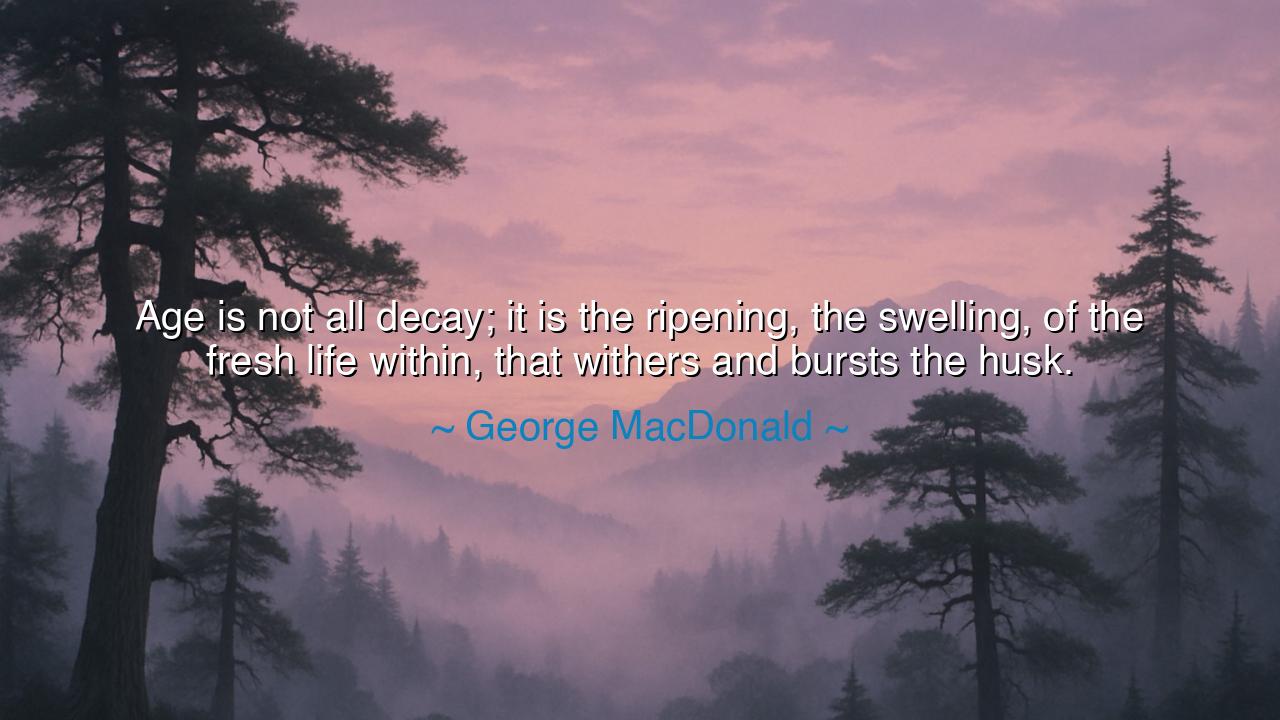
Age is not all decay; it is the ripening, the swelling, of the
Age is not all decay; it is the ripening, the swelling, of the fresh life within, that withers and bursts the husk.






In the endless cycle of life, there comes a moment when we must face the undeniable truth: age is a force that cannot be avoided. But is age a mere decay, a slow withering of the vitality of youth, as some might believe? The great philosopher and author George MacDonald offers a different perspective, one full of hope and promise: "Age is not all decay; it is the ripening, the swelling, of the fresh life within, that withers and bursts the husk." These words echo with the wisdom of the ancients, reminding us that while age may bring change, it is not a mere surrender to time—it is a transformation, a growth that leads to a new form of life and purpose.
What, then, does it mean to say that age is the ripening of life? The image of a fruit ripening on the vine is a powerful one. Just as a seed is planted in the earth, grows in the shelter of the soil, and eventually blossoms into a full and vibrant fruit, so too does a person evolve through the years. Ripening does not signify deterioration; rather, it speaks to the maturation of one’s spirit and wisdom. In the same way that a fruit gains flavor and sweetness as it ripens, a person’s life gains depth and richness with the passage of time. This process, though slow and sometimes imperceptible, brings forth something greater than what was initially planted.
Consider the life of Socrates, whose wisdom grew and deepened with each passing year. In his youth, he was already brilliant, but it was only in his later years that he truly became the sage of Athens, his teachings shaping the very foundation of philosophy. Socrates, though burdened with age and physical decline, remained mentally sharp, his mind ripening like a fruit reaching its fullest potential. It was in his maturity, when others might have retired into the comforts of old age, that he burst forth with the insights and clarity that would forever change the world. Just as the fruit swells to the point of bursting its skin, so too did Socrates' wisdom swell, revealing the depth of his understanding.
Similarly, the great Leonardo da Vinci, in his later years, continued to expand the boundaries of human knowledge. Though his body aged and slowed, his mind grew ever more curious and innovative. He was a man who knew that true ripening comes not from the mere passage of years, but from the growth of one’s inner life. Like a fruit swollen with its ripening, da Vinci’s genius only deepened with time. It was in his later years that he began his most profound works, delving into the complexities of anatomy and engineering, pushing the limits of human understanding. In this way, his aging was not a process of decay, but one of swelling, a bursting forth of his creative power.
But what of the husk that MacDonald speaks of? The husk, the outer shell of the fruit, is that which serves its purpose only in the beginning. It protects, it shields, but it also holds the seed within. As the fruit ripens, the husk becomes less important—it is no longer needed to contain the potential within. The husk is symbolic of our physicality, the body that, though it may age, is not the source of our true essence. As we grow older, we may find that our physical appearance changes, that the strength of youth fades. But within us remains the fresh life—the spirit, the wisdom, and the inner power that, like the fruit, only grows stronger as we mature.
In the same way that the husk of a fruit withers away to reveal its nourishing contents, the physical body ages, but the soul ripens, growing in strength, wisdom, and clarity. Just as the harvest season brings forth the most abundant fruits, so too does the later stage of life bring forth the greatest potential of our inner selves. The life of the elder is not one of decay but of blossoming—a time when we can give our most valuable gifts to the world, a time when our wisdom and experience burst forth in a final, glorious bloom.
Thus, the lesson MacDonald imparts to us is one of hope and reverence for the aging process. Let us not see age as something to be feared or mourned, but as the natural progression of our growth. Let us look to the elders among us, and to ourselves as we grow older, with respect and gratitude for the gifts that age brings—the deepening of wisdom, the cultivation of understanding, and the swelling of the soul. Like the fruit that ripens, let us embrace the process of becoming, knowing that we too, in our maturity, have much to offer the world.
So, let us live our lives not in fear of aging, but in anticipation of the ripening of our spirit. Let us welcome the years as a time of growth, of wisdom, and of the bursting forth of all that we have learned, all that we have become. And when the husk of our body fades, may we be like the fruit that has fully ripened, leaving behind the sweet, enduring essence of a life well-lived. Age is not decay, but the swelling of life’s true gifts—gifts that, once they burst forth, will nourish all who come after.






AAdministratorAdministrator
Welcome, honored guests. Please leave a comment, we will respond soon